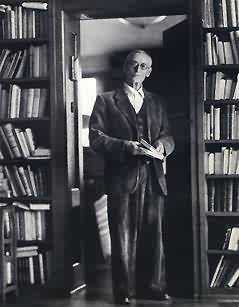 The most fundamental delight which literature can offer has something to do with the perception or discovery of truth, not necessarily a profound or complex or earthshaking truth, but a particular truth of some order. This "epiphany" comes at the moment of recognition when the reader's experience is reflected back at him.
The most fundamental delight which literature can offer has something to do with the perception or discovery of truth, not necessarily a profound or complex or earthshaking truth, but a particular truth of some order. This "epiphany" comes at the moment of recognition when the reader's experience is reflected back at him.
This is what happened to me when idly, and to pass the time on a grey day, I picked up "Wandering: Notes and Sketches" (German title: "Wanderung: Aufzeichnungen") by Hermann Hesse and suddenly found myself totally absorbed in what the backcover had described as 'a fine antidote to the anxiety-provoking pressures of today.' Let the following excerpts speak for themselves:
| Like the day between morning and evening, my life falls between my urge to travel and my homesickness. Maybe some day I will have come far enough for travel and distances to become part of my soul, so that I will have their images within me, without having to make them literally real any more. ["Red House"] Many of my desires in life have been fulfilled. And every fulfillment quickly became satiety. But to be satisfied was the very thing I could not bear. No goal that I reached was a goal, every path was a detour, every rest gave birth to new longing. Many detours I will still follow, many fulfillments will still disillusion me. One day, everything will reveal its meaning. When we are stricken and cannot bear our lives any longer, then a tree has something to say to us: Be still! Be still! Look at me! Life is not easy, life is not difficult. Those are childish thoughts. Let God speak within you, and your thoughts will grow silent. You are anxious because your path leads away from mother and home. But every step and every day lead you back again to the mother. Home is neither here nor there. Home is within you, or home is nowhere at all. From time to time there rises in my soul, without external cause, the dark wave. A shadow runs over the world, like the shadow of a cloud. Joy sounds false, and music stale. Depression pervades everything, dying is better than living. Like an attack this melancholy comes from time to time, I don't know at what intervals, and slowly covers my sky with clouds. It begins with an unrest in the heart, with a premonition of anxiety, probably with my dreams at night. People, houses, colours, sounds that otherwise please me become dubious and seem false. Music gives me a headache. All my mail becomes upsetting and contains hidden arrows. At such times, having to converse with people is torture, and immediately leads to scenes. Because of times like this, one does not own guns; for the same reason, one misses them. Anger, suffering, and complaints are directed at everything, at people, at animals, at the weather, at God, at the paper in the book one is reading, at the material of the very clothing one has on. But anger, impatience, complaints, and hatred have no effect on things, and are deflected from everything, back to myself. I am the one who deserves hatred. I am the one who brings discord and hatred into the world. I am resting after such a day. I know that for a while now rest is to be expected. I know how beautiful the world is; for the time being, it is more beautiful for me than for any other person; colours fuse more delicately, the air flows more blisfully, the light hovers more tenderly. And I know that I must pay for this with the days when life is unbearable. There are good remedies against depression: song, piety, the drinking of wine, making music, writing poems, wandering. By these remedies I live, as the hermit lives by his prayers. Sometimes it seems to me that the scales have tipped, and that my good hours are too seldom and too few to make up for the bad ones. Then sometimes I find that, on the contrary, I have made progress, that the good hours have increased and evil ones decreased. What I never wish, not even in the worst hours, is a middling ground between good and bad, a lukewarm, bearable centre. No, rather an exaggeration of the curve - a worse torment and, because of it, the blessed moments even richer in their brilliance. |


